Otto von Bismarck is one of the most dazzling personalities in German history. Through its war policy, Prussia rose to become the leading power in continental Europe. Bismarck became a folk hero and the first German Chancellor.
Childhood and youth
The name Bismarck stands for social reforms, but also for the fight against the Catholic Church and the socialists. The Bismarck era ended in 1890, but the Bismarck myth endured well after his death.
Otto von Bismarck was born on April 1, 1815 in Schönhausen near Stendal in today's Saxony-Anhalt. In the same year, after Napoleon's final defeat, Europe was reorganized at the Congress of Vienna.
Bismarck's mother comes from a respected family of scholars, his father is the scion of an old Prussian noble family and has large estates, great wealth and great political influence. He becomes a role model for his son, who studies law in Göttingen and Berlin after leaving school.
When his mother died in 1838, Otto von Bismarck gave up his studies shortly before completing them. He returns to his father's estate and manages it together with his brother Bernhard. After the death of his father in 1845, Otto took over the management of Schönhausen completely.
He enjoys feudal life as a wealthy country squire, marries the deeply religious Protestant Johanna von Puttkammer and starts a family with her. They raise their three children Marie, Herbert and Wilhelm together.
Bismarck's way into politics
In addition to his work on his father's estate, Otto von Bismarck became increasingly involved in politics. As a member of the Prussian United Landtag, which is composed of representatives of the estates, he belongs to the conservative camp and is an advocate of the monarchy. Accordingly, in the revolutionary year of 1848, he was on the side of the Prussian King Friedrich Wilhelm IV.
After the bloody suppression of the popular uprising, he was also grateful to Bismarck. He rewarded his political commitment and sent him to Frankfurt am Main in 1851, where Bismarck was to represent Prussia's interests at the German Confederation.
The king had placed his trust in the right man, because Bismarck was fighting vehemently for the Prussian position to be upgraded in the overall German policy determined by the House of Habsburg. In 1858, the liberal-minded Prince Wilhelm of Prussia took over the government from his brother who was ill.
Bismarck realizes that the new regent does not want to go on a confrontational course with Austria and sends him a warning memorandum. In it he speaks of the national idea and of the great advantage that an expansion of Prussia's power could bring.
Roads to Power
Wilhelm I reacted diplomatically level-headed to Bismarck's admonishing words. For the time being he put the hot-tempered Junker out of business and sent him as Prussian envoy, first to St. Petersburg and later to Paris.
But in 1862 Bismarck is back and more important than ever. He becomes the savior in an internal constitutional crisis that has dangerously escalated between the king, the government, the House of Representatives and the military and which could lead to a coup d'état by the generals.
It's about control over the army, which the king wants to hold in his hands, and budgetary powers. Bismarck declared to the king that he would be able to rule against the House of Representatives if necessary, after which the regent appointed him prime minister.
He delivered his famous "Blood and Iron" speech to the most important political body, the budget committee of the Prussian state parliament. In it Bismarck says:"Germany does not look at Prussia's liberalism, but at its power... Prussia's borders according to the Vienna Treaties are not favorable for a healthy state life. Great questions of the time are not decided by speeches and majority decisions, ... but by Iron and blood."
With that, Bismarck has put his cards on the table:War seems to be the right way for him to achieve Prussian dominance.
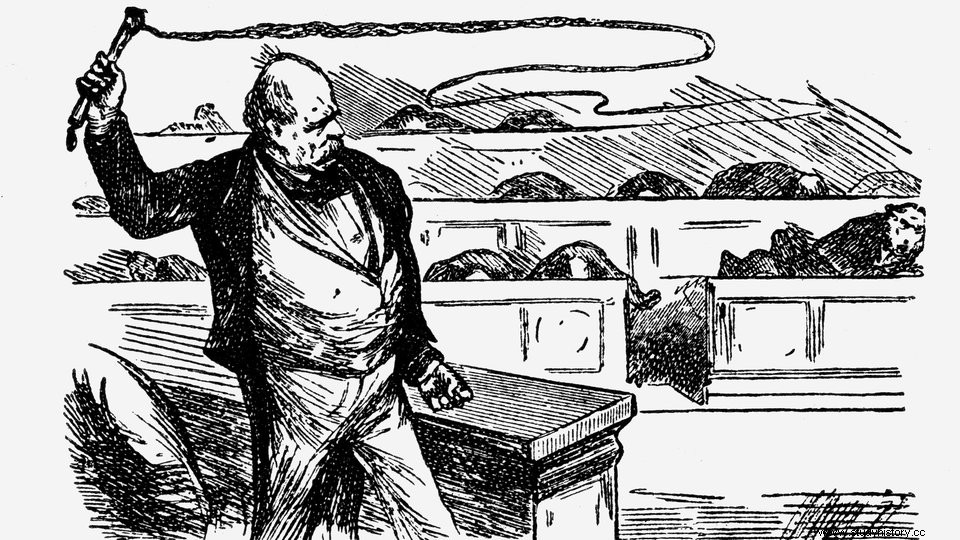
Bismarck's tough style in the parliament of the North German Confederation
With "iron and blood" for Prussia's glory
The burgeoning national awareness among the population, the dream of a united, large German Reich, is the breeding ground for Bismarck's war and expansionist policies, which are intended to bring Prussia the desired position of supremacy. When there was a dispute with Denmark over Schleswig and Holstein, Bismarck had this conflict resolved by the military.
After short and victorious battles, Prussian and Austrian troops together occupy the two duchies. Prussia takes over the administration of Schleswig, Austria administers Holstein. But the allies of the Danish war soon become bitter enemies.
-
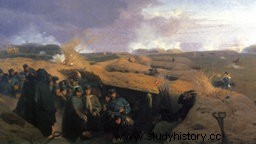 What were the Unification Wars and why were they important for the foundation of the German Empire? | more
What were the Unification Wars and why were they important for the foundation of the German Empire? | more
In 1866, in the struggle for supremacy on the continent, a civil war broke out between Austria and Prussia, which the Prussian troops won in bloody battles. The founding of the North German Confederation is the first important step on the way to German unity.
The next reason for the continuation of his "blood and iron" policy came from the Franco-Prussian scandal over the occupation of the Spanish throne, which led to the Franco-Prussian War in 1870.
Through a skilful move with the so-called "Emser Depesche", Bismarck managed to get France to declare war. As a result, the alliance came about, which also involved the southern German states on the side of the North German Confederation in the war.
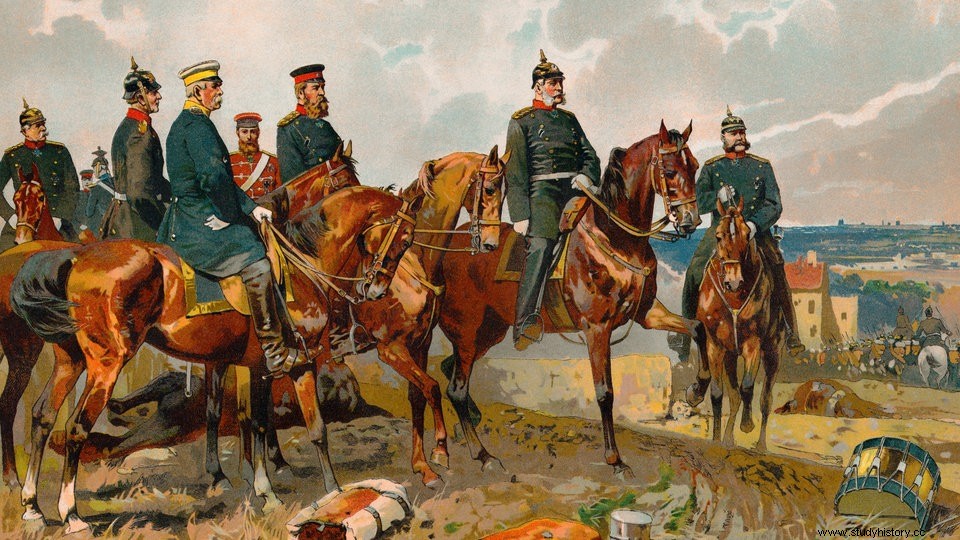
Bismarck with Kaiser Wilhelm I during the Franco-Prussian War
Bismarck's rise and fall
Bismarck immediately put to political use the victory over France achieved jointly by the North German Confederation and the South German states. On January 18, 1871, Wilhelm I was proclaimed German Emperor in the Hall of Mirrors at Versailles Palace and the unified German national state was proclaimed. Otto von Bismarck becomes the first chancellor of this newly created empire.
Due to its size, its military strength and rapidly growing industrialization, Germany is becoming the strongest political and economic power in Europe. But no sooner has this goal been achieved than problems arise on the domestic political front.
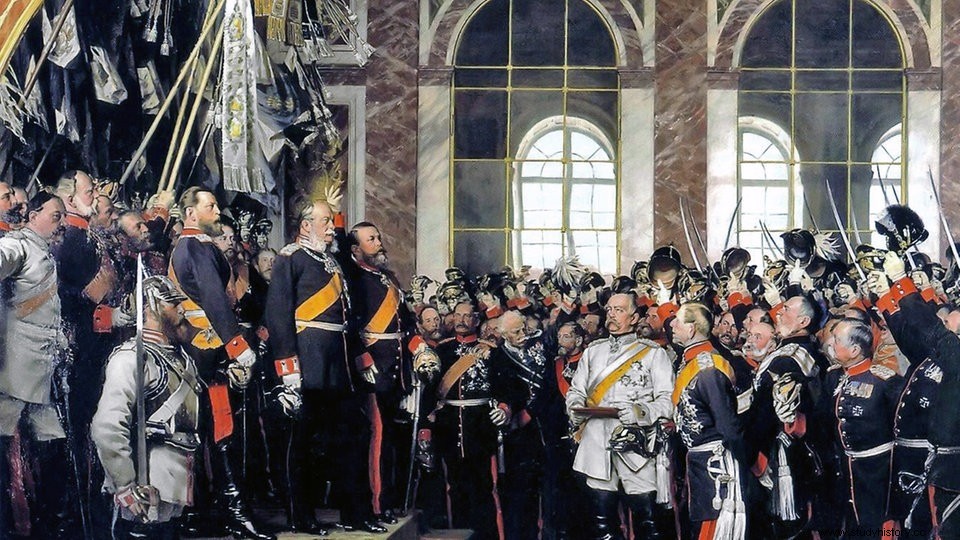
Bismarck at the Kaiser proclamation in Versailles
Bismarck tried to put the socialists, whom he saw as a danger, in their place with harsh laws. Almost at the same time, he engaged in a tough confrontation with the Catholic Church and the Center Party, which was close to it. In the so-called Kulturkampf, he weakened clerical influence on the state and introduced binding civil marriage.
In addition, he ensures that the living conditions of the working class are improved with progressive social reforms. Bismarck's days were numbered when Wilhelm II became emperor for the last time in the so-called Year of the Three Emperors in 1888.
Unlike his predecessors, the new regent wants to curtail Bismarck's powers. A rift ensued and finally the Chancellor resigned. The Bismarck era ended in March 1889, the myth of the "Iron Chancellor" lives on to this day.
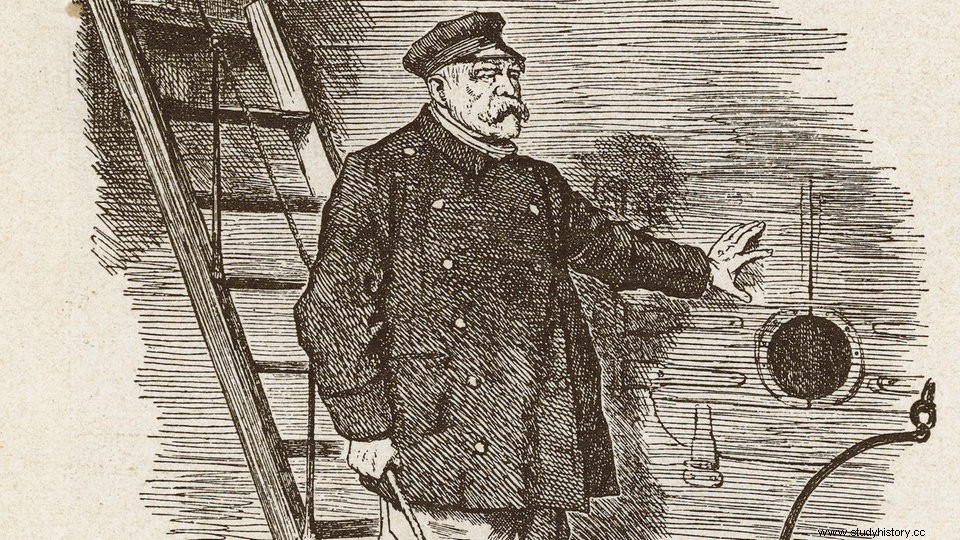
The cartoon "The pilot disembarks" deals with Bismarck's resignation as Chancellor
